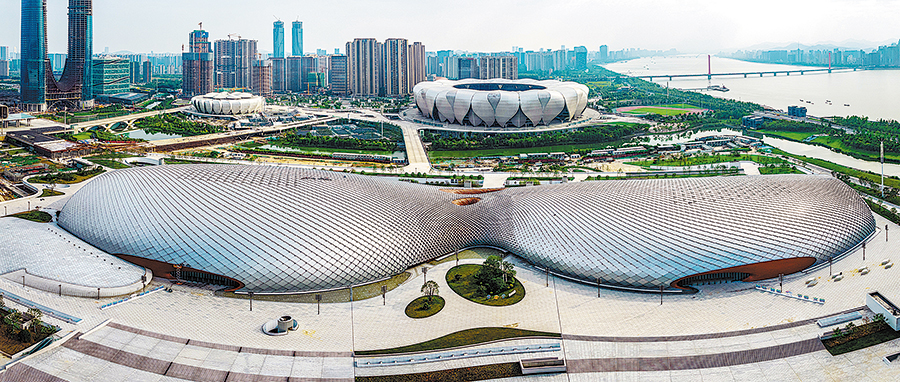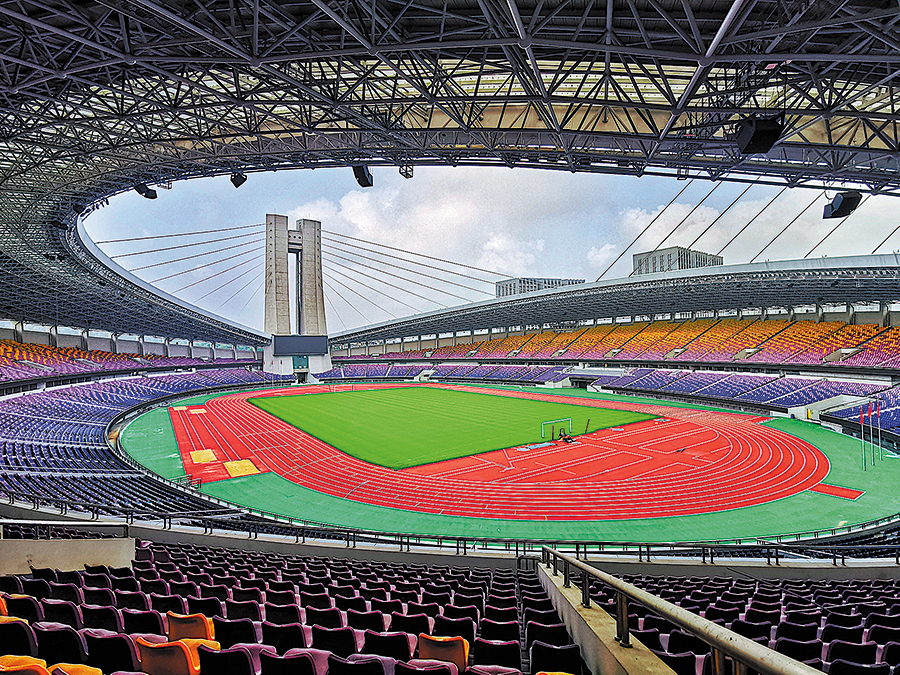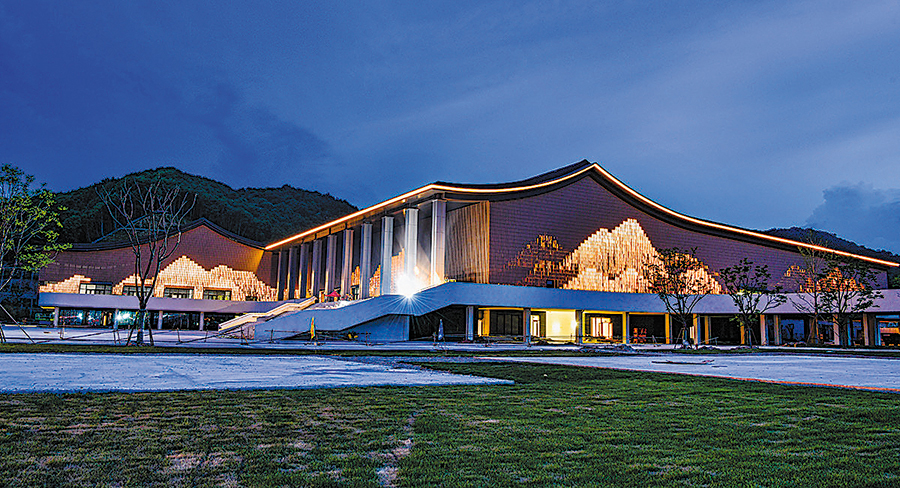
Hangzhou Olympic Sports Center, the main site of the 2022 Asian Games, features a stunning butterfly-shaped venue which incorporates a natatorium and a gymnasium to host swimming, diving and basketball. Pictured behind the giant silver-white structure is the center’s main stadium – aka the ‘Big Lotus’ – which will host the opening and closing ceremonies, and track and field events. [Photo provided to China Daily]
Asian Games venues completed as state-of-the-art facilities promise to deliver exceptional event
With less than six months to go, preparations for the Hangzhou Asian Games are in full swing.
Organizers delivered the latest update on Thursday, confirming that all competition venues have been completed.
The 56 venues for the 19th Asian Games Hangzhou 2022 (Sept 10-25) and the fourth Asian Para Games (Oct 9-15) have been finished on schedule, according to the organizing committee. They comprise 12 new, 26 renovated, nine rebuilt and nine temporary venues.
In addition, a total of 31 training venues, one Asian Games village and four Asian Games sub-villages will be ready in the coming months to provide accommodation, catering and medical services for athletes and other participants.
Hangzhou, the capital of Zhejiang province, will host the largest number of events during the Games.
The city’s Huanglong Sports Center, which comprises a main stadium, a gymnasium and a natatorium, will host soccer, gymnastics and water polo at the Asian Games, and track and field events for the Asian Para Games.u;ppp
Huanglong Stadium’s soccer pitch is composed of both natural and artificial grass, making it more durable than a standard surface and helping it recover faster amid a busy schedule of matches during the Games.
According to Song Haiqiang, a senior engineer at Huanglong Sports Center, the stadium features a world-class plastic track which boasts superior performance and is ecologically friendly.
“The stadium can accommodate up to 60,000 people. All the seats have also been upgraded with more striking colors, such as purple, orange and blue,” said Song.

The main stadium at Huanglong Sports Center will host soccer at the Asian Games. [Photo provided to China Daily]
“Additionally, there will be two 360-degree circular screen strips, at 590 meters and 490 meters in length respectively inside the stadium. These will offer an enjoyable and unique viewing experience for the audience.”
Two 85-meter-high towers stand at either side of the stadium with two large screens at their centers to display scores and action replays during the Games in real time.
On the east and west sides of each tower, laser projections can present live images of events in real time, and can be seen by the naked eye up to 3 kilometers away.
As the venue which will host the most competitions during the Hangzhou Asian Games, the Huanglong center will stage six test competitions-five of which are national level-from April through June to ensure preparations are conducted as thoroughly as possible.
The Hangzhou Olympic Sports Center is arguably the most visually stunning of all the Games’ new venues. A main stadium, dubbed the “Giant Lotus” thanks to its lotus flower design, will host the opening and closing ceremonies, and the track and field competitions.
The center’s most eye-catching venue is a butterfly-shaped building that combines a natatorium and a gymnasium, and features a silver-white metal roof.
The design is inspired by the Chinese folktale of Liang Shanbo and Zhu Yingtai-sometimes referred to as “The Butterfly Lovers” and dubbed the “oriental Romeo and Juliet”.
Meng Fangli, a staff member of the Asian Games’ operating company, said that the main gymnasium spans a total construction area of 76,107 square meters.
“There are 18,000 seats, of which 15,000 are fixed. Forty seats for persons with disability have been added, and each barrier-free seat is equipped with a corresponding chair for a guide or carer,” said Meng.

Fuyang Yinhu Sports Center in Hangzhou’s Fuyang district will host shooting, archery and modern pentathlon. [Photo provided to China Daily]
The natatorium, which features a swimming pool and a diving pool, has a construction area of 53,959 square meters and can seat about 6,000 spectators.
Set above the main gymnasium and natatorium are 210 light tubes, which diffuse natural light indoors, according to Guo Jingyang, a PR officer for the Asian Games operating company.
After the Games, the main gymnasium will host large-scale events and performing arts activities, while the swimming area will be open to the public and as a training venue for athletes.
Meanwhile, the Fuyang Yinhu Sports Center in Fuyang district will host shooting, archery and modern pentathlon during the Games.
The design of the building, which comprises 34,000 louvers (angled slats), is inspired by the outline of the famous Chinese landscape painting Fuchun Mountain Residence.
The construction of Fuyang Yinhu Sports Center takes full advantage of being surrounded by mountains and water to create a Chinese garden-style effect.
Wu Xiao, the project leader of the construction department, said more than 34,000 rotating louvers are installed on the curtain walls to form a picture of Fuchun Mountains.
With a special design behind each louver, the picture of Fuchun Mountains presents an artistic impression of the Fuchun landscape with a 200-meter-long light belt on the ceiling of the museum when night falls.
After the Games, the Hangzhou Shooting Management Center will take over the main venue to host shooting sports training, competitions and exhibitions.
Fuyang district will host competitions such as rowing, canoeing, kayaking, shooting, archery, and modern pentathlon. A total of 77 gold medals will be up for grabs in Fuyang during the Games.
Fang Xiaoying in Hangzhou contributed to this story





